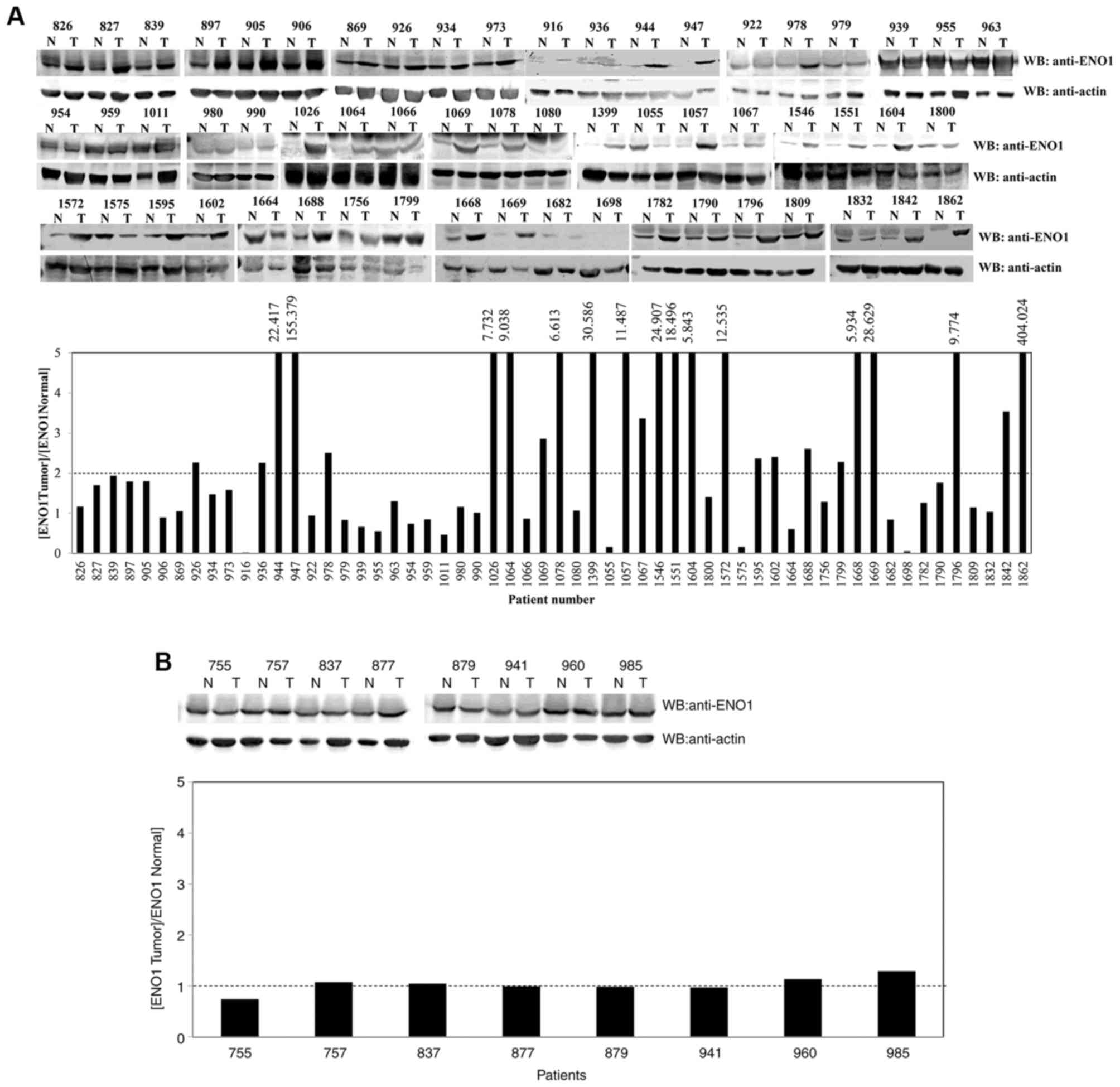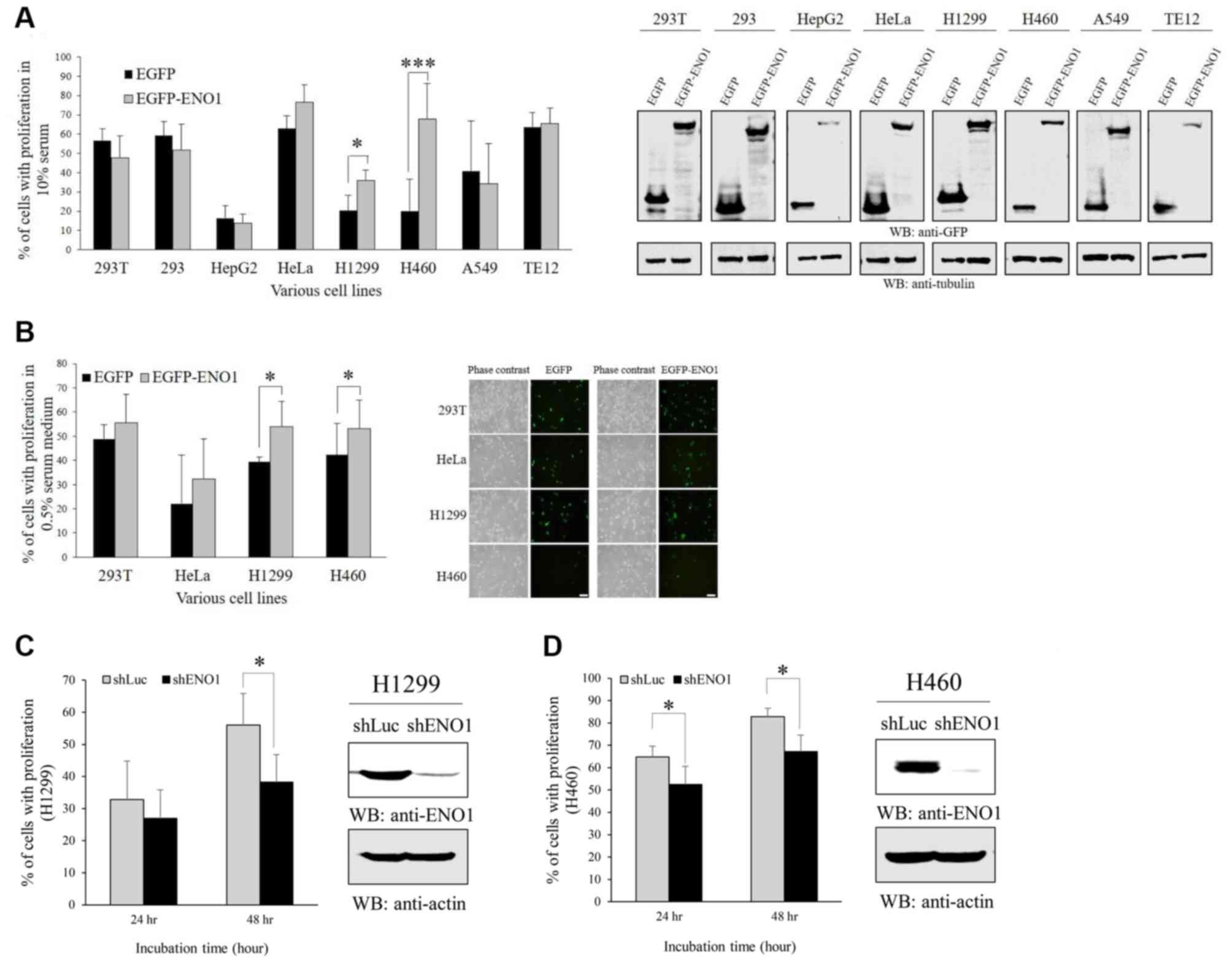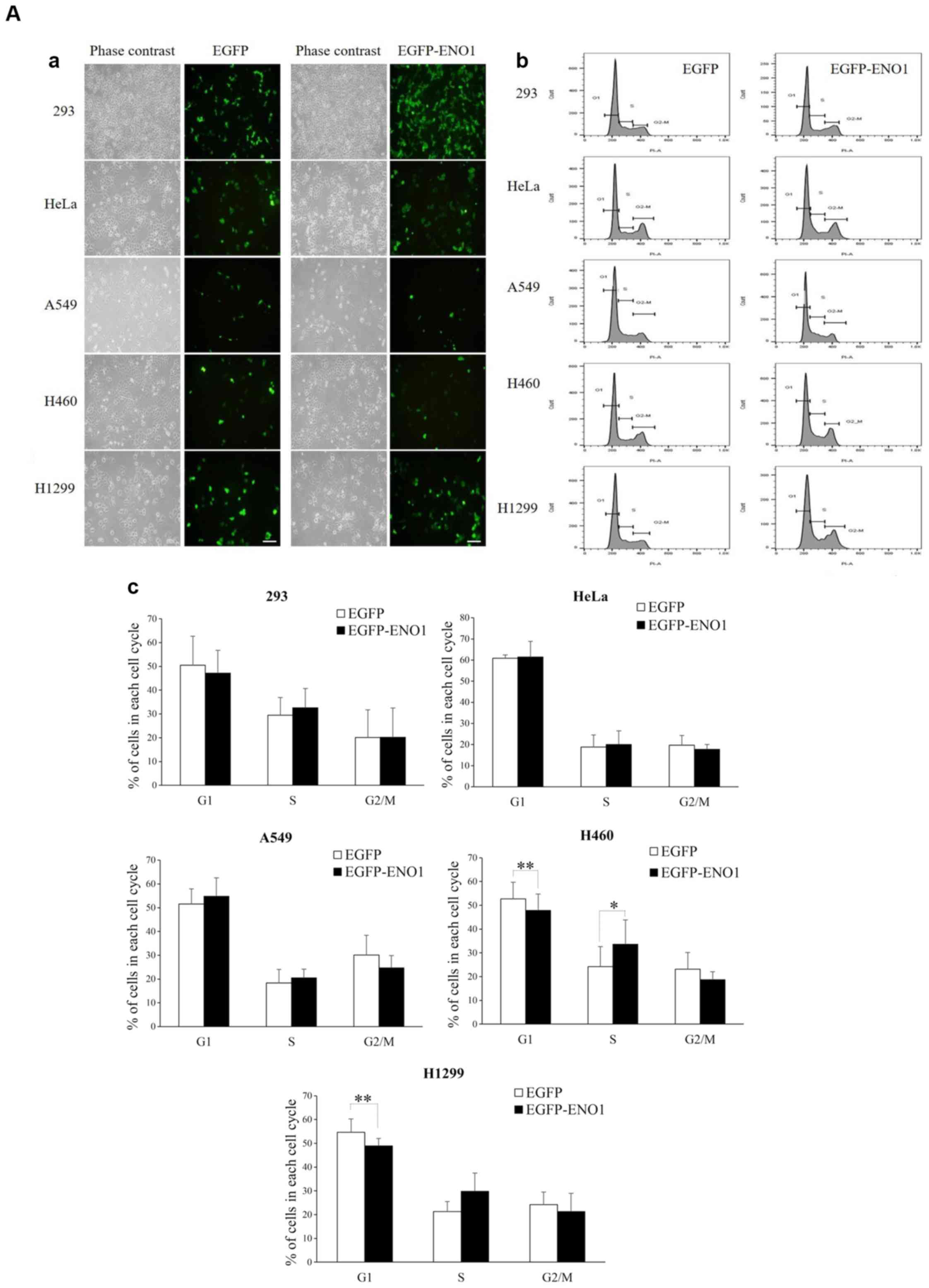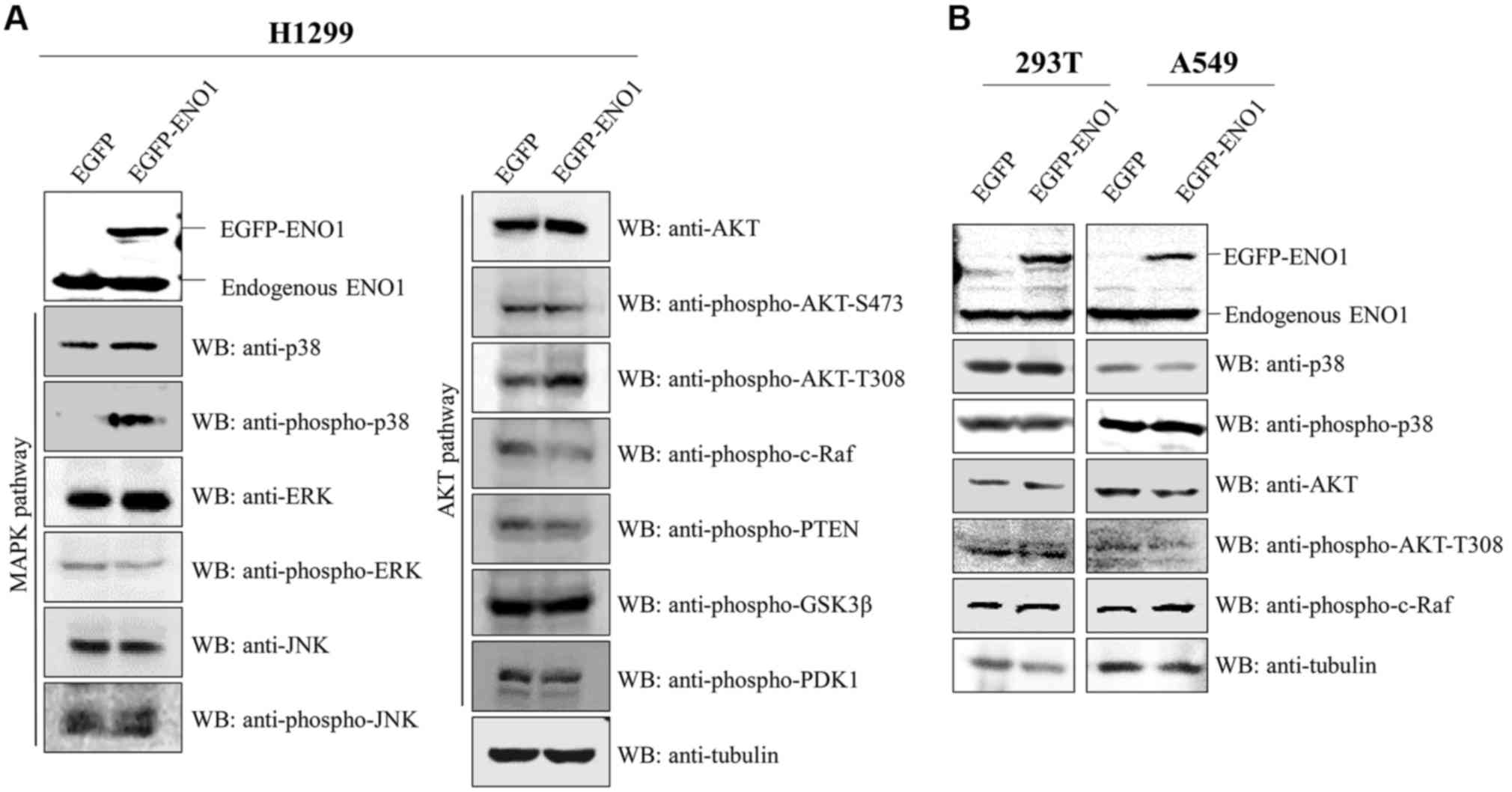|
1
|
Pancholi V: Multifunctional alpha-enolase:
Its role in diseases. Cell Mol Life Sci. 58:902–920. 2001.
View Article : Google Scholar : PubMed/NCBI
|
|
2
|
Verma M and Dutta SK: DNA sequences
encoding enolase are remarkably conserved from yeast to mammals.
Life Sci. 55:893–899. 1994. View Article : Google Scholar : PubMed/NCBI
|
|
3
|
Díaz-Ramos A, Roig-Borrellas A,
García-Melero A and López-Alemany R: α-Enolase, a multifunctional
protein: Its role on pathophysiological situations. Nd J Biomed
Biotechnol. 2012:1567952012.
|
|
4
|
Nakajima T, Kato K, Kaneko A, Tsumuraya M,
Morinaga S and Shimosato Y: High concentrations of enolase, alpha-
and gamma-subunits, in the aqueous humor in cases of
retinoblastoma. Am J Ophthalmol. 101:102–106. 1986. View Article : Google Scholar : PubMed/NCBI
|
|
5
|
Zhu W, Li H, Yu Y, Chen J, Chen X, Ren F,
Ren Z and Cui G: Enolase-1 serves as a biomarker of diagnosis and
prognosis in hepatocellular carcinoma patients. Cancer Manag Res.
10:5735–5745. 2018. View Article : Google Scholar : PubMed/NCBI
|
|
6
|
Sun L, Guo C, Cao J, Burnett J, Yang Z,
Ran Y and Sun D: Over-expression of alpha-enolase as a prognostic
biomarker in patients with pancreatic cancer. Int J Med Sci.
14:655–661. 2017. View Article : Google Scholar : PubMed/NCBI
|
|
7
|
Kaneko N, Gotoh A, Okamura N, Matsuo E,
Terao S, Watanabe M, Yamada Y, Hamami G, Nakamura T, Ikekita M, et
al: Potential tumor markers of renal cell carcinoma: A-enolase for
postoperative follow up, and galectin-1 and galectin-3 for primary
detection. Int J Urol. 20:530–535. 2013. View Article : Google Scholar : PubMed/NCBI
|
|
8
|
White-AI Habeeb NM, Di Meo A, Scorilas A,
Rotondo F, Masui O, Seivwright A, Gabril M, Girgis AH, Jewett MA
and Yousef GM: Alpha-enolase is a potential prognostic marker in
clear cell renal cell carcinoma. Clin Exp Metastasis. 32:531–541.
2015. View Article : Google Scholar : PubMed/NCBI
|
|
9
|
Yonglitthipagon P, Pairojkul C,
Bhudhisawasdi V, Mulvenna J, Loukas A and Sripa B: Proteomics-based
identification of α-enolase as a potential prognostic marker in
cholangiocarcinoma. Clin Biochem. 45:827–834. 2012. View Article : Google Scholar : PubMed/NCBI
|
|
10
|
Chu PY, Hsu NC, Liao AT, Shih NY, Hou MF
and Liu CH: Overexpression of α-enolase correlates with poor
survival in canine mammary carcinoma. BMC Vet Res. 7:622011.
View Article : Google Scholar : PubMed/NCBI
|
|
11
|
Sun L, Lu T, Tian K, Zhou D, Yuan J, Wang
X, Zhu Z, Wan D, Yao Y, Zhu X and He S: Alpha-enolase promotes
gastric cancer cell proliferation and metastasis via regulating AKT
signaling pathway. Eur J Pharmacol. 845:8–15. 2018. View Article : Google Scholar : PubMed/NCBI
|
|
12
|
Fu QF, Liu Y, Fan Y, Hua SN, Qu HY, Dong
SW, Li RL, Zhao MY, Zhen Y, Yu XL, et al: Alpha-enolase promotes
cell glycolysis, growth, migration, and invasion in non-small cell
lung cancer through FAK-mediated PI3K/AKT pathway. J Hematol Oncol.
8:222015. View Article : Google Scholar : PubMed/NCBI
|
|
13
|
Principe M, Borgoni S, Cascione M,
Chattaragada MS, Ferri-Borgogno S, Capello M, Bulfamante S,
Chapelle J, Di Modugno F, Defilippi P, et al: Alpha-enolase (ENO1)
controls alpha v/beta 3 integrin expression and regulates
pancreatic cancer adhesion, invasion, and metastasis. J Hematol
Oncol. 10:162017. View Article : Google Scholar : PubMed/NCBI
|
|
14
|
Zhan P, Zhao S, Yan H, Yin C, Xiao Y, Wang
Y, Ni R, Chen W, Wei G and Zhang P: α-enolase promotes
tumorigenesis and metastasis via regulating AMPK/mTOR pathway in
colorectal cancer. Mol Carcinog. 56:1427–1437. 2017. View Article : Google Scholar : PubMed/NCBI
|
|
15
|
Song Y, Luo Q, Long H, Hu Z, Que T, Zhang
X, Li Z, Wang G, Yi L, Liu Z, et al: Alpha-enolase as a potential
cancer prognostic marker promotes cell growth, migration, and
invasion in glioma. Mol Cancer. 13:652014. View Article : Google Scholar : PubMed/NCBI
|
|
16
|
Qian X, Xu W, Xu J, Shi Q, Li J, Weng Y,
Jiang Z, Feng L, Wang X, Zhou J and Jin H: Enolase 1 stimulates
glycolysis to promote chemoresistance in gastric cancer.
Oncotarget. 8:47691–47708. 2017. View Article : Google Scholar : PubMed/NCBI
|
|
17
|
Tu SH, Chang CC, Chen CS, Tam KW, Wang YJ,
Lee CH, Lin HW, Cheng TC, Huang CS, Chu JS, et al: Increased
expression of enolase alpha in human breast cancer confers
tamoxifen resistance in human breast cancer cells. Breast Cancer
Res Treat. 121:539–553. 2010. View Article : Google Scholar : PubMed/NCBI
|
|
18
|
Zhao M, Fang W, Wang Y, Guo S, Shu L, Wang
L, Chen Y, Fu Q, Liu Y, Hua S, et al: Enolase-1 is a therapeutic
target in endometrial carcinoma. Oncotarget. 6:15610–15627.
2015.PubMed/NCBI
|
|
19
|
Gao S, Li H, Feng XJ, Li M, Liu ZP, Cai Y,
Lu J, Huang XY, Wang JJ, Li Q, et al: α-Enolase plays a
catalytically independent role in doxorubicin-induced cardiomyocyte
apoptosis and mitochondrial dysfunction. J Mol Cell Cardiol.
79:92–103. 2015. View Article : Google Scholar : PubMed/NCBI
|
|
20
|
Lopez-Alemany R, Suelves M, Diaz-Ramos A,
Vidal B and Munoz-Canoves P: Alpha-enolase plasminogen receptor in
myogenesis. Front Biosci. 10:30–36. 2005. View Article : Google Scholar : PubMed/NCBI
|
|
21
|
Chang YS, Wu W, Walsh G, Hong WK and Mao
L: Enolase-alpha is frequently down-regulated in non-small cell
lung cancer and predicts aggressive biological behavior. Clin
Cancer Res. 9:3641–3644. 2003.PubMed/NCBI
|
|
22
|
Yu CT, Hsia JY, Hseih YC, Su LJ, Lee TC,
Ku CF, Chen KS, Chen JM, Wei TY, Lee YC, et al: The novel protein
suppressed in lung cancer down-regulated in lung cancer tissues
retards cell proliferation and inhibits the oncokinase Aurora-A. J
Thorac Oncol. 6:988–997. 2011. View Article : Google Scholar : PubMed/NCBI
|
|
23
|
Bonni A, Brunet A, West AE, Datta SR,
Takasu MA and Greenberg ME: Cell survival promoted by the Ras-MAPK
signaling pathway by transcription-dependent and -independent
mechanisms. Science. 286:1358–1362. 1999. View Article : Google Scholar : PubMed/NCBI
|
|
24
|
Song G, Ouyang G and Bao S: The activation
of Akt/PKB signaling pathway and cell survival. J Cell Mol Med.
9:59–71. 2005. View Article : Google Scholar : PubMed/NCBI
|
|
25
|
Facchinetti V, Ouyang W, Wei H, Soto N,
Lazorchak A, Gould C, Lowry C, Newton AC, Mao Y, Miao RQ, et al:
The mammalian target of rapamycin complex 2 controls folding and
stability of Akt and protein kinase C. EMBO J. 27:1932–1943. 2008.
View Article : Google Scholar : PubMed/NCBI
|
|
26
|
Dai J, Zhou Q, Chen J, Rexius-Hall ML,
Rehman J and Zhou G: Alpha-enolase regulates the malignant
phenotype of pulmonary artery smooth muscle cells via the AMPK-Akt
pathway. Nat Commun. 9:38502018. View Article : Google Scholar : PubMed/NCBI
|
|
27
|
Wygrecka M, Marsh LM, Morty RE, Henneke I,
Guenther A, Lohmeyer J, Markart P and Preissner KT: Enolase-1
promotes plasminogen-mediated recruitment of monocytes to the
acutely inflamed lung. Blood. 113:5588–5598. 2009. View Article : Google Scholar : PubMed/NCBI
|
|
28
|
Burysek L, Syrovets T and Simmet T: The
serine protease plasmin triggers expression of MCP-1 and CD40 in
human primary monocytes via activation of p38 MAPK and janus kinase
(JAK)/STAT signaling pathways. J Biol Chem. 277:33509–33517. 2002.
View Article : Google Scholar : PubMed/NCBI
|
|
29
|
Ji H, Wang J, Guo J, Li Y, Lian S, Guo W,
Yang H, Kong F, Zhen L, Guo L and Liu Y: Progress in the biological
function of alpha-enolase. Anim Nutr. 2:12–17. 2016. View Article : Google Scholar : PubMed/NCBI
|


















